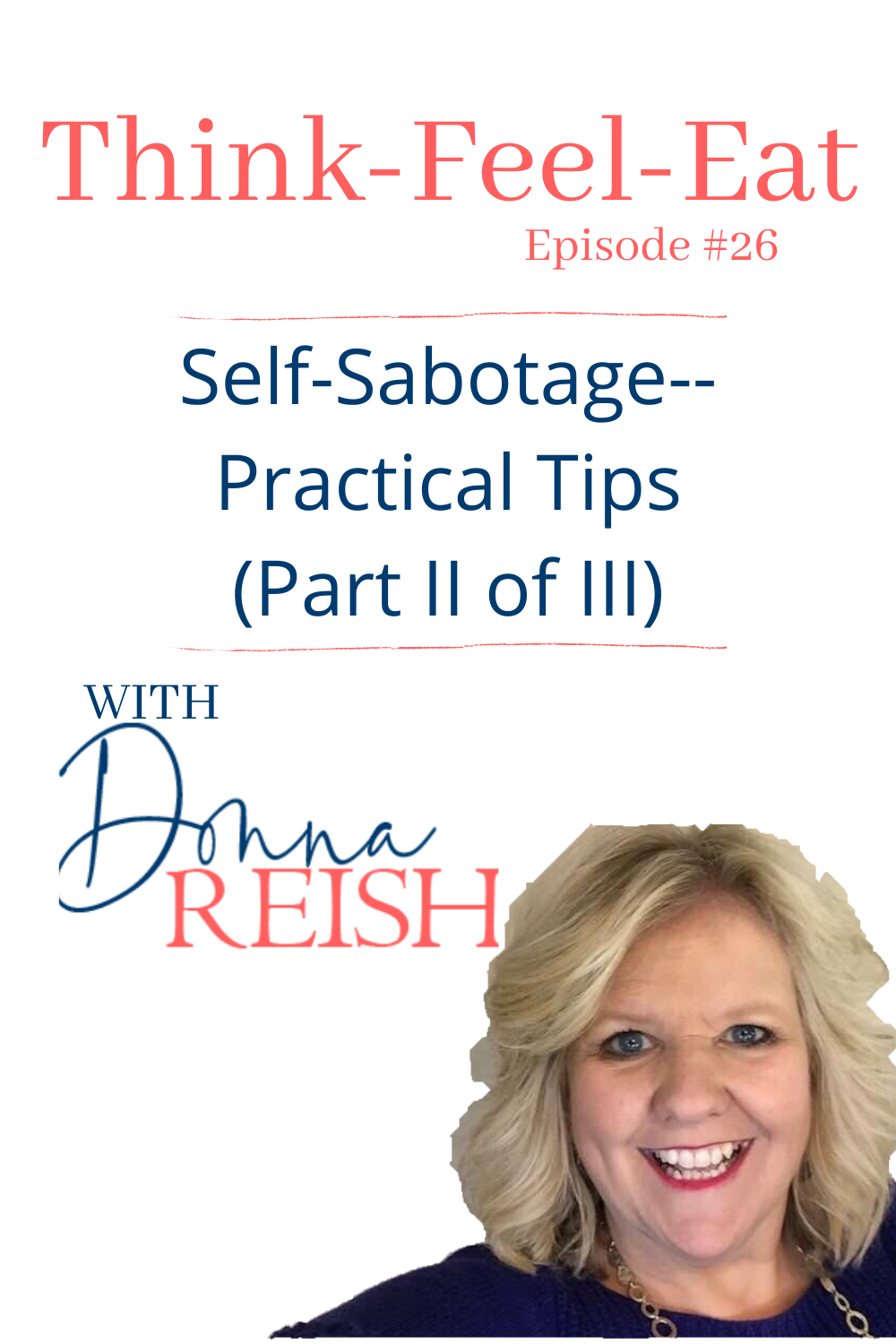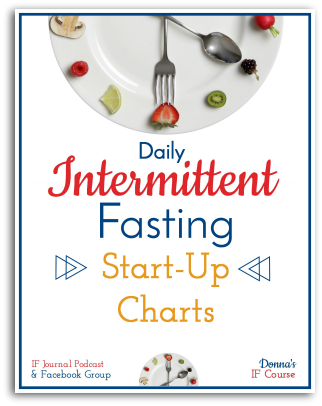
Think-Feel-Eat Episode #45: Qualities Needed for Weight Loss (Part II of III)
Hi! I’m Donna Reish, IF teacher, weight loss coach, blogger, and half of “The Minus 220 Pound Pair” as my husband and I have lost over 220 pounds together (160 of that in the past couple of years through the Weight Loss Lifestyle habits and strategies I teach!). In this episode, I present more qualities/skills needed for weight loss.
In Episode #44, I presented two important qualities for weights loss: Thoughtfulness (thinking!) and Honesty (my personal goal right now). These were even eye-opening for me as I outlined and presented them!
In today’s episode, I begin with a study “Maintenance of Lost Weight and Long-Term Management of Obesity”. In this study, it reveals that people are more likely to keep weight off when they lose one pound per week (as opposed to faster weight loss). This is a meta-study, so it brought together 29 long-term weight loss studies. (Of course, there are other individual studies saying that fast weight loss is better because of the immediate rewards, but this episode is focusing on Patience, Perseverance, and Self-Control—all of which are more likely with slower weight loss.)
For this week’s qualities/skills, I begin with the combination of Patience and Perseverance. These two qualities are closely related in that when we are dealing with long-term goals requiring Patience, we must also have the Perseverance to keep going even when we are awaiting a long-term goal.
We persevere (don’t give up) when we see success. But we also persevere when what we are asking of ourselves isn’t too difficult to do. As soon as we take on a protocol or eating plan that is too hard to sustain, perseverance goes out the window.
The last quality I discuss today is Self-Control. I present some recent self-discoveries around the concept of immediate gratification. That is, that maybe always seeking for delayed gratification isn’t the answer. When we only have two choices—eating cupcakes now or eating them in three months at Disney World, the latter seems too far out there (time wise and craving-wise). So I offered my new thoughts on three types of gratification:
1) Immediate gratification
2) Intermediary gratification
3) Delayed/long-term gratification
I posit that this could be the reason that Intermittent Fasting is so popular (we don’t have to wait too long to eat); that Flexible Dieting (macro counting, Weight Watchers, If It Fits Your Macros, etc.) is so popular, and more.
(Of course, in the Self-Control section, I also discuss dopamine/brain circuitry’s effect and hormone’s effect as discussed in previous episodes.)
There is hope for developing qualities and skills that are needed for weight loss—or for expanding current skills in other life areas to weight management!
Find all of my episodes, outlines, and articles for my two weekly broadcasts:
(1) Weight Loss Lifestyle broadcast (formerly Donna’s Intermittent Fasting Broadcast)
Think Feel Eat Outline 45 Qualities Needed for Weight Loss Part II of III
A. Review
1. We can develop qualities and skills AND we can increase the ones we already have AND we can apply the ones we have in other areas of life to weight loss/weight management
2. We can overcome the brain chemicals and circuitry and hormones so that the qualities we want can come forth
B. Study of Long Term Weight Maintenance: Maintenance of lost weight and long-term management of obesity
1. In a meta-analysis of 29 long-term weight loss studies, more than half of the lost weight was regained within two years, and by five years more than 80% of lost weight was regained.
2. Research shows that people are more likely to keep weight off if they lose one pound a week (confirming that incrementality helps us build long term skills)
3. Fast weight loss can definitely work if a person can stay with such extreme, rigid approach for the time it takes to lose the weight—if the person has a maintenance plan in place.
C. First Two Qualities—Episode #44
1. Thoughtfulness
1. Thinking about our thoughts
2. Thinking about our weight loss/weight management
2. Honesty
1. Honesty with ourselves about counting
2. Honesty with ourselves about what we eat, how much we move, our start/stop time, our planning, our execution of our plan, etc.
3. Incrementality—TFE 19 and TFE 20 Self-Integrity
D. Patience and Perseverance
1. Intertwined
2. As we are patient without expectations of super fast loss, we will be able to persevere more
3. As we are patient without expectations of super fast loss, we will be choosing things we can actually do—and this affects our perseverance
4. We persevere when we have success, have a protocol we don’t have to run away from for relief all the time, can see non-scale victories, and like the food we are eating.
5. We persevere when we have already proven to ourselves that we can do things that are somewhat challenging—then we can move to the harder things: First Four Journal Sheets and TFE 42 Benefits of First Four
E. Self-Control–
1. Three kinds of gratification
a. Immediate gratification
b. Delayed/long term gratification
c. New thought—intermediary gratification
2. Create your own protocol working around your level of self control at that time—What Will I Really Do? TFE 43
3. Willpower WLL 60 and 61
F. Get More Help!
1. Join my FREE FB group where I record videocast/podcast episodes!
2. Emails with teaching around weight management—articles, videos, free charts and booklets, and more: donnareish.com
3. Take my month-long Intermittent Fasting course


























